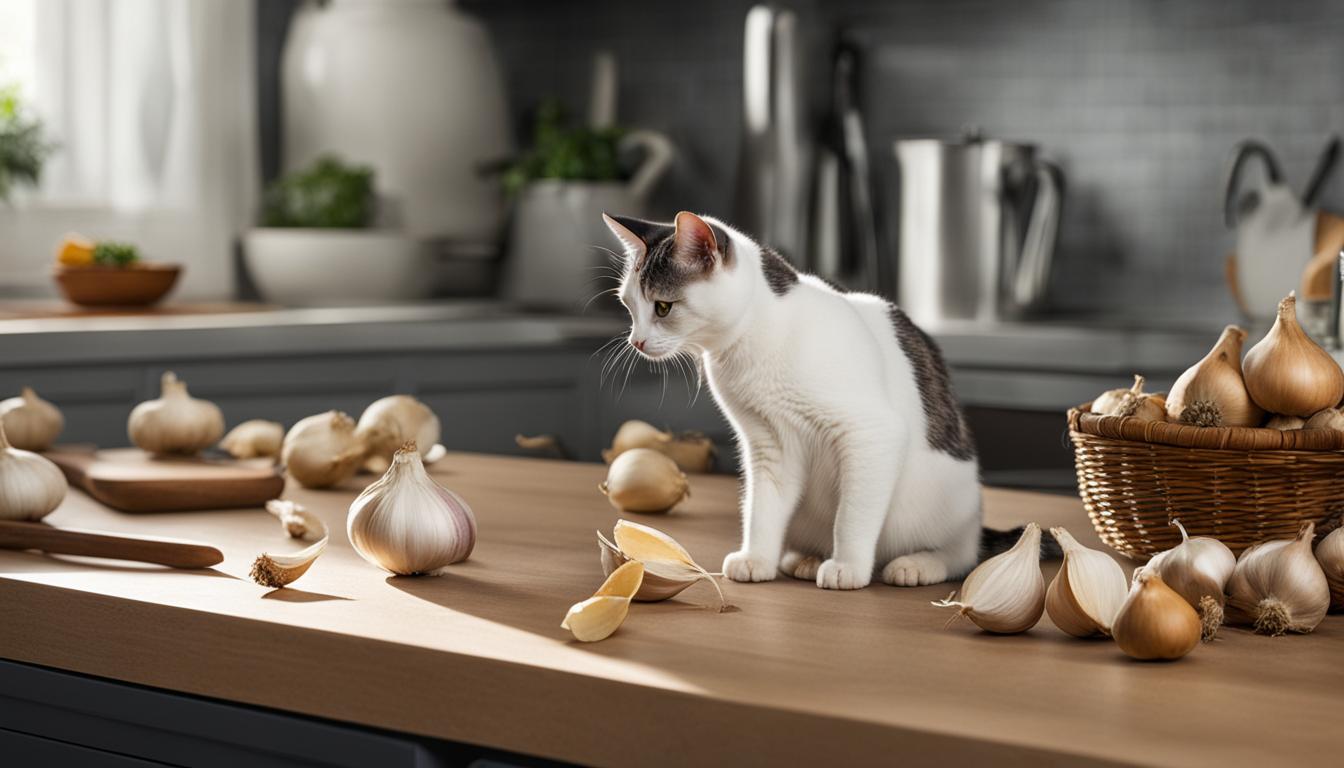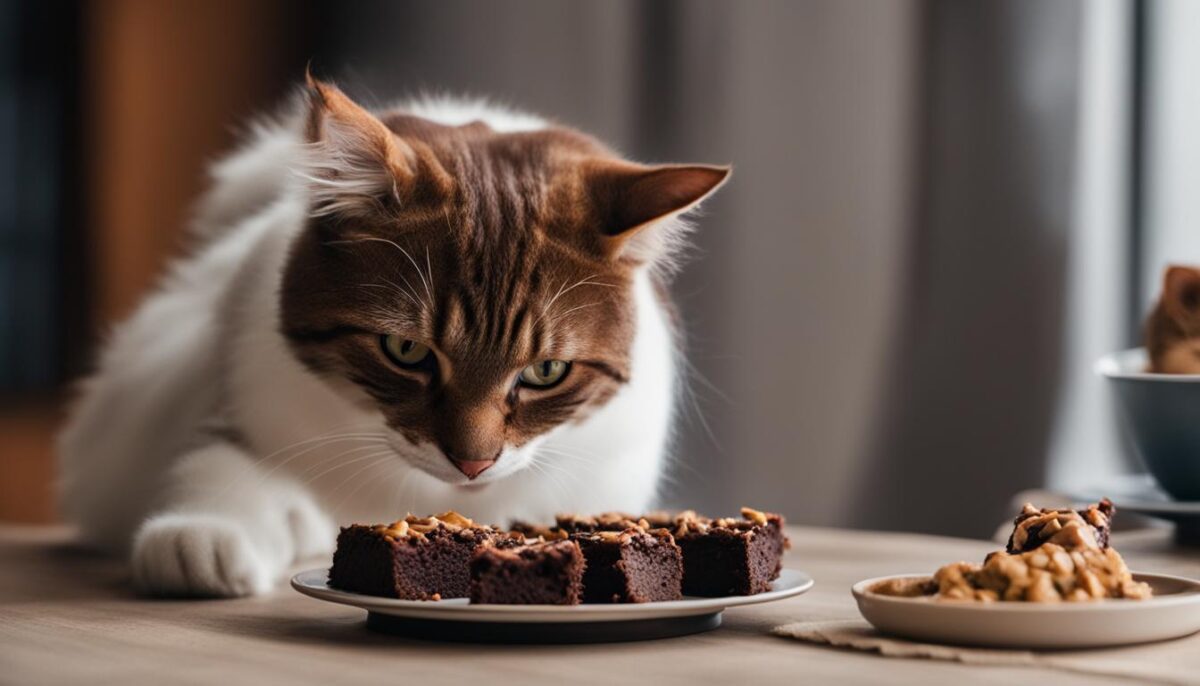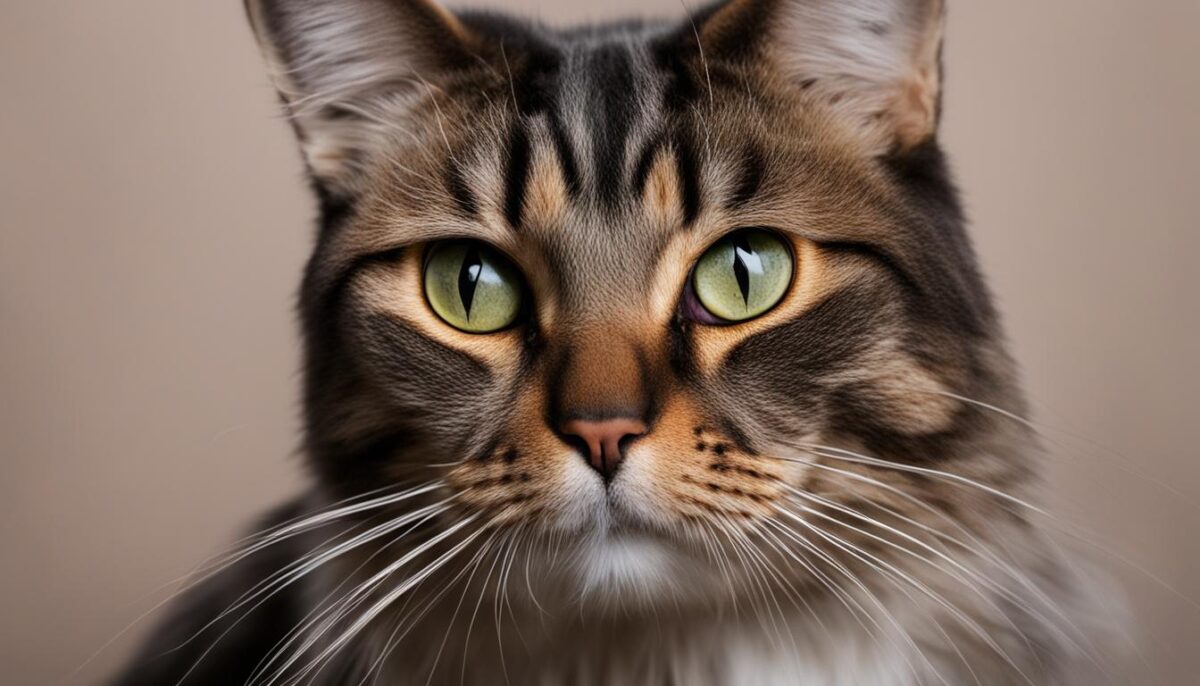Many people are unaware that onions and garlic are toxic to pets, including cats. These foods belong to the Allium family, which also includes chives, leeks, shallots, and onions. Allium vegetables contain a compound called N-propyl disulfide, which can damage red blood cells in cats. This can lead to anemia, severe organ failure, and even death. It’s important to be cautious and avoid allowing your cat to ingest any form of garlic.
Key Takeaways:
- Garlic is toxic to cats and should be avoided in their diet.
- Even small amounts of garlic can lead to severe health issues, including anemia and organ failure.
- Keep all garlic and onion products out of your cat’s reach to prevent potential toxicity.
- Consult with a veterinarian for proper nutrition and guidance for your cat’s diet.
- Provide a balanced and nutritionally complete cat food for your feline friend.
Why is Garlic Harmful to Cats?
Garlic may be a popular ingredient in many human dishes, but when it comes to cats, it poses significant health risks. Garlic contains compounds called disulfides and thiosulphates, which can wreak havoc on a cat’s delicate system. When a cat ingests garlic, these compounds enter their bloodstream and destroy red blood cells, leading to a condition known as hemolytic anemia. This condition is characterized by a rapid destruction of red blood cells, which can be life-threatening for cats.
The harmful effects of garlic on cats are serious and can manifest in various ways. Lethargy, hiding, pale gums, vomiting, diarrhea, increased heart rate, and rapid breathing are all potential symptoms of garlic ingestion. It’s crucial to be vigilant and watch for these signs if you suspect your furry friend has consumed garlic.
The toxicity level of garlic for cats is relatively low, and even a small amount can be dangerous. Just a single clove or 197 milligrams of garlic powder can lead to poisoning. The severity of the toxicity can also depend on factors such as the cat’s weight, breed, and overall health. Breeds like Siamese, Burmese, and Singapura may be more susceptible to garlic poisoning. Therefore, it’s essential to keep all garlic and onion products out of your cat’s reach to ensure their safety.
Symptoms of Garlic Ingestion in Cats:
- Lethargy and weakness
- Hiding and decreased activity
- Pale gums and mucous membranes
- Vomiting and diarrhea
- Increased heart rate and respiratory rate
How Much Garlic is Poisonous to Cats?
Even a small amount of garlic can be toxic to cats. The compound N-propyl disulfide found in garlic can damage their red blood cells, leading to anemia and organ failure. The level of toxicity depends on factors such as the cat’s weight, breed, and overall health. Certain breeds, like Siamese, Burmese, and Singapura, are more sensitive to garlic poisoning. Just a single clove or 197 milligrams of garlic powder can be enough to cause poisoning in cats.
To give you a better understanding of the toxicity levels, here’s a table showing the minimum amount of garlic that can be toxic to cats based on their weight:
| Cat’s Weight | Minimum Toxic Amount of Garlic |
|---|---|
| 5 lbs | 0.7 grams |
| 10 lbs | 1.4 grams |
| 15 lbs | 2.1 grams |
| 20 lbs | 2.8 grams |
As you can see from the table, even a small amount of garlic can be dangerous for cats. It is crucial to keep all garlic and onion products out of their reach to prevent potential toxicity.
Can Cats be Allergic to Garlic?
While cats can be allergic to certain substances, such as certain proteins or environmental allergens, there is limited information on whether cats can be specifically allergic to garlic. However, given the potential toxicity of garlic to cats, it’s best to avoid exposing them to this ingredient altogether.
Allergic reactions in cats can lead to symptoms such as itching, skin rashes, gastrointestinal upset, and respiratory issues. If you suspect your cat may have an allergy, consult with your veterinarian for proper diagnosis and guidance. They can perform allergy tests and recommend the best course of action to manage your cat’s allergies.
Common Signs of Allergies in Cats
- Constant scratching or grooming
- Skin redness or inflammation
- Excessive sneezing or coughing
- Runny nose or eyes
- Vomiting or diarrhea
- Ear infections
It’s important to note that while garlic itself may not be a common allergen for cats, other ingredients commonly found in garlic-based dishes, such as spices or preservatives, may trigger an allergic reaction. Therefore, it’s crucial to carefully read ingredient labels and avoid feeding your cat any foods that contain garlic or related ingredients.
Table: Common Allergens for Cats
| Allergen | Symptoms |
|---|---|
| Pollen | Sneezing, itchy eyes, runny nose |
| Dust mites | Itchy skin, sneezing, coughing |
| Mold spores | Sneezing, coughing, respiratory issues |
| Certain proteins (e.g., chicken, fish) | Itchy skin, vomiting, diarrhea |
If you suspect that your cat may be experiencing an allergic reaction to a specific ingredient, it’s important to consult with your veterinarian for proper diagnosis and guidance. They can help identify the allergen through various tests and recommend an appropriate diet or treatment plan for your cat’s specific needs.
What Should Cats Eat Instead?
When it comes to feeding your cat, it’s essential to provide them with a balanced and nutritionally complete diet. Cats are obligate carnivores, which means their bodies are adapted to thrive on a meat-based diet. While it may be tempting to share your meals with your furry friend, it’s important to remember that cats have different dietary needs than humans.
A high-quality commercial cat food that is specifically formulated for cats is the best choice for meeting their nutritional requirements. Look for cat foods that list a high-quality source of animal protein, such as chicken or fish, as the main ingredient. These foods are specially formulated to provide the right balance of protein, fat, and essential nutrients that cats need for optimal health.
In addition to cat food, fresh water should always be available for your cat. Cats have a low thirst drive, so it’s important to encourage them to drink by providing clean, fresh water in a separate bowl from their food. Some cats also enjoy drinking from fountains or running water sources, so you may want to consider providing these options as well.
| What Cats Should Eat | What Cats Should Avoid |
|---|---|
|
|
Remember, a well-balanced diet is crucial for maintaining your cat’s overall health and well-being. If you have any concerns or questions about your cat’s diet, it’s always best to consult with your veterinarian. They can provide personalized guidance based on your cat’s individual needs, age, and health conditions.
Other Foods to Avoid Feeding Cats
In addition to garlic, there are several other foods that can be harmful or toxic to cats. It’s important to be aware of these substances and take precautions to keep them out of your cat’s reach. Here is a list of foods that should never be given to cats:
- Chocolate: Chocolate contains theobromine, which can cause vomiting, diarrhea, rapid breathing, abnormal heart rhythm, seizures, and even death in cats.
- Grapes and Raisins: Grapes and raisins can cause kidney failure in cats. Even small amounts can be toxic and lead to serious health issues.
- Coffee: Coffee contains caffeine, which is highly toxic to cats. Ingestion of coffee can cause restlessness, rapid breathing, heart palpitations, muscle tremors, and even death.
- Alcohol: Alcohol can cause severe poisoning in cats. It can lead to vomiting, disorientation, depression, seizures, difficulty breathing, and even coma.
- Raw Dough: Raw dough containing yeast can expand in a cat’s stomach, leading to bloating and potential blockages. Moreover, yeast produces alcohol during the fermentation process, which can cause alcohol poisoning.
- Citrus Fruits: Citrus fruits, such as oranges, lemons, and limes, contain essential oils that can cause gastrointestinal upset and central nervous system depression in cats.
- Coconut Flesh and Water: Coconut flesh and water can cause stomach upset, bloating, and loose stools in cats. Additionally, the high fat content in coconut can lead to pancreatitis.
- Xylitol: Xylitol is a sugar substitute commonly found in chewing gum, candies, and baked goods. Ingestion of xylitol can cause a rapid release of insulin, resulting in hypoglycemia (low blood sugar) in cats.
It’s important to remember that cats have unique dietary needs, and certain foods that are safe for humans can be extremely dangerous for them. Always consult with your veterinarian if you have any doubts about which foods are safe to feed your cat.
Table: Foods to Avoid Feeding Cats
| Foods | Harmful Effects |
|---|---|
| Chocolate | Can cause vomiting, diarrhea, rapid breathing, abnormal heart rhythm, seizures, and even death. |
| Grapes and Raisins | Can cause kidney failure. |
| Coffee | Contains caffeine, which can cause restlessness, rapid breathing, heart palpitations, muscle tremors, and even death. |
| Alcohol | Can cause severe poisoning, leading to vomiting, disorientation, depression, seizures, difficulty breathing, and even coma. |
| Raw Dough | Can cause bloating and potential blockages in the digestive system. Can also lead to alcohol poisoning. |
| Citrus Fruits | Contain essential oils that can cause gastrointestinal upset and central nervous system depression. |
| Coconut Flesh and Water | Can cause stomach upset, bloating, loose stools, and increase the risk of pancreatitis. |
| Xylitol | Can cause a rapid release of insulin, resulting in hypoglycemia (low blood sugar). |
By being aware of these foods and keeping them out of your cat’s diet, you can help ensure their well-being and prevent potential health issues.
Seeking Veterinary Care for Garlic Ingestion
If you suspect that your cat has ingested garlic or any other toxic food, it is crucial to seek immediate veterinary care. Garlic is highly toxic to cats and can have severe health consequences if not treated promptly. Here are the steps your veterinarian may take to address garlic ingestion in your cat:
- Assessment: The veterinarian will first assess the cat’s condition, looking for any symptoms of garlic toxicity. These may include lethargy, pale gums, vomiting, diarrhea, increased heart rate, and increased respiratory rate. The severity of the symptoms will help determine the appropriate treatment.
- Treatment: The veterinarian may induce vomiting to remove any remaining garlic from the cat’s stomach. They may also administer activated charcoal to absorb any toxins in the digestive system. In certain cases, gastric lavage (stomach pumping) may be necessary to thoroughly cleanse the stomach.
- Supportive Care: Intravenous fluids may be administered to prevent dehydration and support the cat’s overall well-being. The veterinarian may also monitor the cat’s bloodwork and provide any additional treatments as necessary.
- Observation and Recovery: The cat will be closely observed during the recovery period to ensure that there are no further complications. The length of the recovery period depends on the severity of the poisoning and the cat’s response to treatment.
It is important to remember that time is of the essence when it comes to garlic ingestion in cats. Delaying veterinary care can put your cat’s health at risk. If you suspect your cat has ingested garlic or any other toxic substance, do not hesitate to contact your veterinarian immediately.
Table: Symptoms of Garlic Ingestion in Cats
| Symptom | Description |
|---|---|
| Lethargy | Unusual tiredness or lack of energy |
| Pale gums | Gums appearing lighter in color than usual |
| Vomiting | Forceful expulsion of stomach contents through the mouth |
| Diarrhea | Loose or watery stool |
| Increased heart rate | Elevated heart rate above normal resting levels |
| Increased respiratory rate | Rapid breathing or panting |
Remember, as a responsible cat owner, it is essential to keep all garlic and onion products securely stored and out of your cat’s reach. By being vigilant and proactive, you can help prevent accidental garlic ingestion and protect your cat’s health and well-being.
Conclusion
After learning about the harmful effects of garlic on cats, it’s clear that this ingredient should never be included in their diet. Garlic is highly toxic to cats and can lead to serious health problems, including anemia and organ failure. It’s essential to prioritize your cat’s well-being by keeping all garlic and onion products out of their reach.
If you’re wondering what your cat should eat instead, a balanced and nutritionally complete cat food is the best choice. Consult with your veterinarian to determine the right cat food for your pet’s individual needs. Additionally, always ensure fresh water is available for your cat to stay hydrated.
In conclusion, while garlic may be a tasty ingredient for humans, it poses significant risks to our feline friends. By being cautious about what foods we offer our cats, we can help keep them safe and healthy. Remember, when it comes to garlic and cats, it’s always better to be safe than sorry.
FAQ
Can cats eat garlic?
No, cats should not eat garlic. Garlic is toxic to cats and can cause severe health issues, including anemia and organ failure.
Why is garlic harmful to cats?
Garlic contains compounds that can destroy a cat’s red blood cells, leading to anemia and other serious health problems.
How much garlic is poisonous to cats?
Even a small amount of garlic can be toxic to cats. As little as a single clove or 197 milligrams of garlic powder can lead to poisoning.
Can cats be allergic to garlic?
While there is limited information on whether cats can be specifically allergic to garlic, it’s best to avoid exposing them to this ingredient due to its potential toxicity.
What should cats eat instead of garlic?
Cats should primarily consume a balanced and nutritionally complete cat food that is specifically formulated for their dietary needs.
Are there other foods to avoid feeding cats?
Yes, in addition to garlic, there are several other foods that can be harmful or toxic to cats, including chocolate, grapes and raisins, coffee, alcohol, raw dough, citrus fruits, coconut, and xylitol.
What should I do if my cat ingests garlic?
If you suspect your cat has ingested garlic or any other toxic food, seek veterinary care immediately. Prompt treatment is crucial to prevent further complications.
Is garlic safe for cats?
No, garlic is not safe for cats. It is highly toxic and should be avoided in their diet to ensure their health and well-being.


